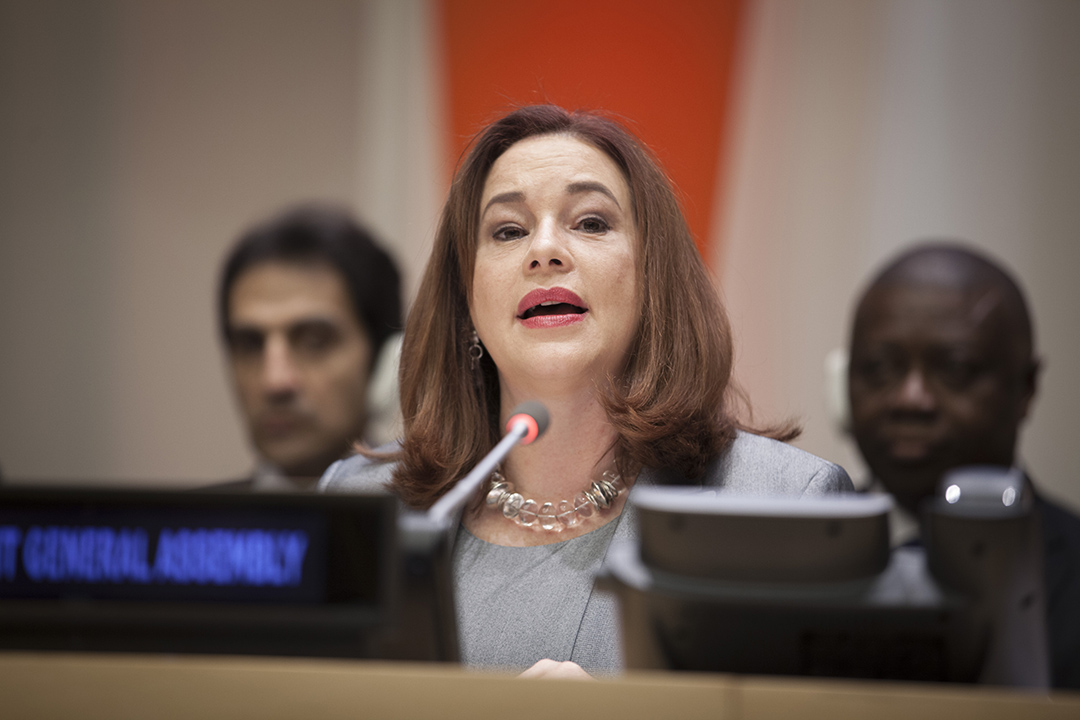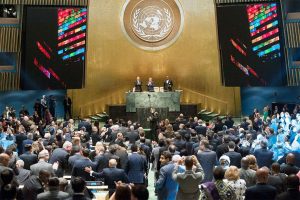18 July 2019: UN General Assembly (UNGA) President Maria Fernanda Espinosa Garces has announced the themes of the six Leaders’ Dialogues that will take place as part of the SDG Summit in September 2019. The themes are identified in a concept note circulated to UN Member States.
The SDG Summit is the meeting of the UN High-level Political Forum on Sustainable Development (HLPF) to be convened under UNGA auspices at the level of Heads of State and Government, from 24-25 September 2019. The UNGA is expected to adopt an outcome political declaration during the opening session of the Summit. According to the concept note, the 55-minute Leaders Dialogues are intended to provide platforms for Heads of State and Government to share insights, give specific guidance, and make recommendations on the six main themes that will be addressed during the Summit.
The concept note indicates that the themes for the Leaders Dialogues are inspired by the 2019 Global Sustainable Development Report (GSDR) prepared by a team of independent scientists, and the UN Secretary-General’s Special Edition of the annual SDG Progress Report. The themes are:
- I. Megatrends Impacting the Achievement of the SDGs;
- II. Accelerating the Achievement of the SDGs: Critical Entry Points;
- III. Leveraging Progress Across the SDGs;
- IV. Localizing the SDGs;
- V. Partnerships for Sustainable Development; and
- VI. 2020-2030 Vision.
According to the concept note, session I will consider the implementation of the 2030 Agenda in the context of megatrends, including: the response of governments in planning and adapting SDG actions; opportunities presented by these trends for accelerating progress across multiple Goals and targets; and the potential impact of collaborations and partnerships towards more sustainable outcomes.
Session II will consider how strategic actions can be applied by multiple actors and institutions at critical entry points for transformations that will accelerate progress across multiple SDGs. It will focus on how an integrated approach to policy-making and partnerships for the 2030 Agenda can be applied in practical terms through tangible entry points and actions in systemic and cross-cutting areas.
Session III will explore how “levers” like governance, economy and finance, individual and collective action, and science and technology can be used in strategic combinations and partnerships to drive the transformations towards sustainable development. Participants will be invited to discuss concrete interventions that draw on a mix of policy measures, financial mechanisms, effective partnerships, and insights from science and technology to drive change. According to the note, the emphasis will be on success stories and approaches that can be transferred from one national or sub-national context to another, including through partnerships, capacity building programmes, city networks and other collaborations.
Session IV will focus on country-level experiences in localizing the SDGs, adapting them to national and local situations, and incorporating them in policies, institutions, financial frameworks and ways of working. It will also discuss the mobilization of national and local actors around the SDGs.
Session V will explore the progress in revitalizing the Global Partnership for Sustainable Development and international cooperation. It will also identify impactful multi-stakeholder partnerships for SDG, implementation, identify gaps to guide partnership development in the next decade, and highlight good practices and lessons learned in overcoming the various challenges brought by the multi-stakeholder approach to improve partnership effectiveness.
Session VI will focus on the vision for the ten-year period remaining until 2030. It will also address the targets that have a completion date of 2020 to assess progress and options for the way forward. Leaders will be further invited to highlight the critical actions they intend to take in the short- and long-term to ensure all targets and goals are achieved by 2030. [Concept Note – Leaders Dialogues for the SDG Summit]

